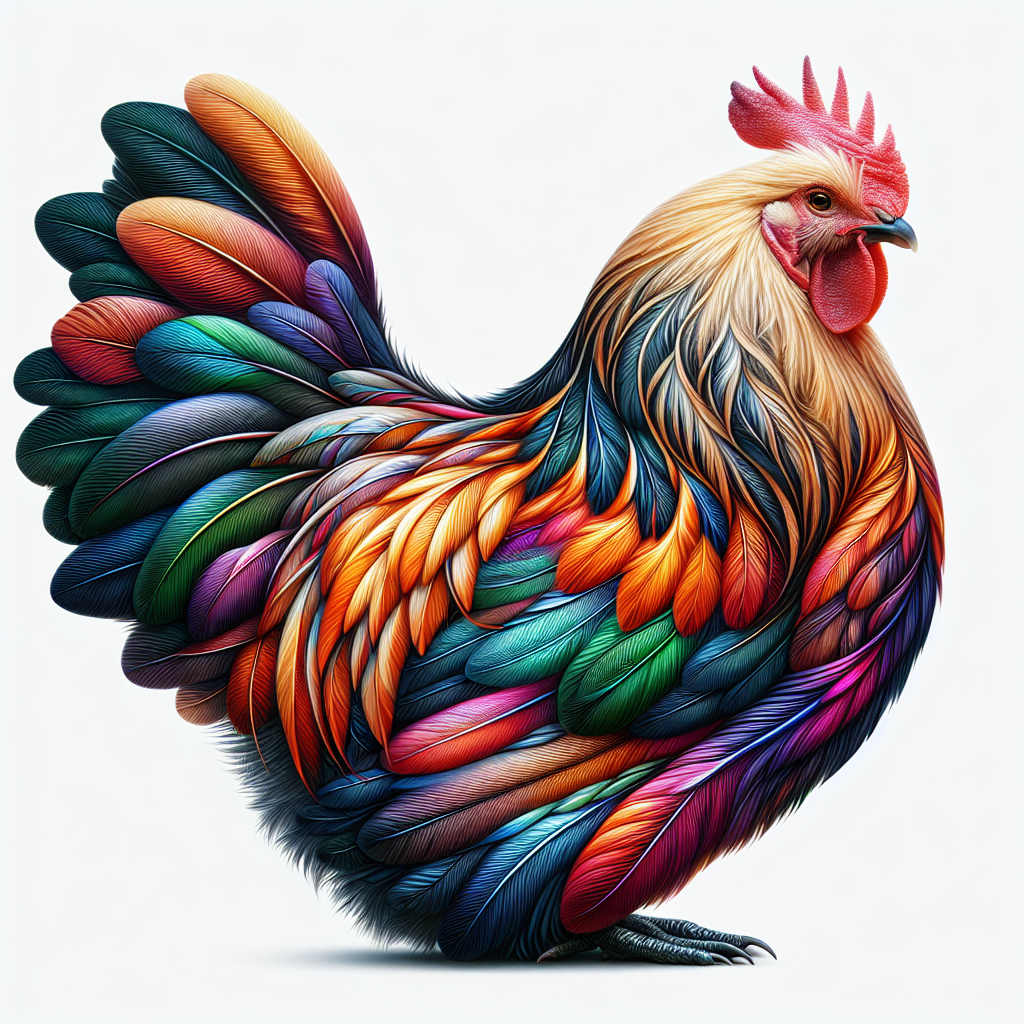Have you ever wondered how hybrid chickens fare in terms of lifespan compared to other breeds? The longevity of our feathered friends can vary significantly depending on their genetics and breeding. In this article, we will explore the lifespans of hybrid chickens and how they stack up against their purebred counterparts. From the hearty Rhode Island Reds to the elegant Sussex, get ready to discover the fascinating world of chicken lifespans! So, grab a cup of tea, settle into your favorite chair, and let’s unravel the mysteries of these remarkable birds.
Factors Affecting Lifespan of Chickens
When it comes to the lifespan of chickens, several factors play a crucial role. By understanding these factors, you can make informed decisions about the care and management of your flock, ultimately ensuring their longevity and well-being.
Genetics
Genetics is a significant determinant of a chicken’s lifespan. Different breeds have different levels of inherent resistance to diseases and genetic disorders, which can directly impact their lifespan. Certain breeds, both hybrid and purebred, are bred for specific genetic traits, such as disease resistance or high productivity, which can influence their longevity.
Diet and Nutrition
Proper diet and nutrition are essential for chickens’ overall health and lifespan. A balanced diet rich in key nutrients, vitamins, and minerals is crucial for their growth, immunity, and overall well-being. A diet lacking in essential nutrients can lead to various health issues, compromised immune systems, and ultimately, a shorter lifespan. It is important to provide chickens with a well-rounded diet that includes a mix of grains, proteins, fresh fruits and vegetables, and access to fresh water at all times.
Environment
The environment in which chickens are raised also plays a significant role in their lifespan. Chickens should be provided with a clean and comfortable living space that protects them from extreme weather conditions, predators, and diseases. A well-ventilated coop with ample space and access to natural sunlight promotes their overall health and well-being, contributing to a longer lifespan.
Management Practices
Effective management practices are crucial for maximizing the lifespan of chickens. Regular health check-ups, proper biosecurity measures, and disease prevention protocols are essential to ward off potential health issues and ensure the well-being of the flock. In addition, implementing good flock management practices such as appropriate stocking density, regular cleaning and sanitization, and providing adequate space for exercise and socializing can greatly enhance the lifespan of chickens.
Defining Hybrid Chickens
Hybrid chickens, also known as crossbreeds, are the result of intentional crossbreeding between two different purebred chicken breeds. This selective breeding process aims to combine desirable traits from each breed to create offspring with enhanced qualities.
Genetic Background
Hybrid chickens inherit their genetic traits from both parent breeds. By carefully selecting the parent breeds, breeders can create hybrids with specific characteristics, such as disease resistance, high egg-laying performance, or meat quality. The genetic background of hybrid chickens plays a crucial role in determining their overall lifespan and the traits they exhibit.
Crossbreeding Process
To create hybrid chickens, breeders carefully select two purebred parent breeds that possess the desired traits. The process involves breeding birds from each parent breed to produce a first-generation hybrid, also known as an F1 cross. These F1 hybrids often display improved characteristics compared to the parent breeds, as they inherit a combination of traits from both parents. Subsequent generations can further refine and enhance these traits through selective breeding.
Comparing Hybrid Chickens with Purebred Breeds
Hybrid chickens have gained popularity due to the advantages they offer over purebred breeds. Let’s explore how hybrid chickens compare to purebred breeds in terms of health, productivity, and behavior.
Health and Disease Resistance
One of the significant advantages of hybrid chickens is their increased resistance to diseases. By selectively breeding for disease resistance, hybrids often exhibit stronger immune systems compared to some purebred breeds. This enhanced resistance can result in a longer lifespan, as chickens are less prone to illness and infections.
Egg Laying Performance
Hybrid chickens are known for their exceptional egg-laying performance. They typically outperform many purebred breeds in terms of egg quantity and consistency. Hybrid hens often lay a greater number of eggs over an extended period, resulting in higher productivity. This increased egg-laying capacity can contribute to the overall well-being and longevity of hybrid chickens.
Meat Quality
Hybrid chickens are often bred with the intention of improving meat quality. They may exhibit desirable meat traits, such as fast growth rate, tender meat, and favorable carcass composition. However, it is important to note that the meat quality of hybrids can vary depending on the specific breeds used and the breeding objectives. Selective breeding for meat quality can indirectly impact the lifespan, as chickens bred for rapid growth may have a shorter lifespan compared to slower-growing breeds.
Temperament and Behavior
Hybrid chickens may also exhibit desirable temperament and behavior traits. They are often bred to be friendly, docile, and easy to handle, making them more suitable for backyard or family settings. This calm and social behavior can contribute to reduced stress levels, better overall health, and potentially a longer lifespan.
Common Hybrid Chicken Breeds
Several hybrid chicken breeds have gained popularity due to their unique characteristics and benefits. Let’s explore some of the most commonly found hybrid breeds:
Red Sex Link
The Red Sex Link is a popular hybrid breed known for its excellent egg-laying abilities. These chickens are the result of crossbreeding a Rhode Island Red or New Hampshire Red rooster with a White Rock or White Leghorn hen. Red Sex Links are sexually dimorphic, allowing easy identification of sexes based on their feather coloration. They are known for their calm temperament, disease resistance, and consistent egg production.
Black Star
Black Star chickens are another hybrid breed known for their exceptional egg-laying capabilities and striking appearance. They are created by crossing a Rhode Island Red or New Hampshire Red rooster with a Barred Plymouth Rock hen. Black Stars exhibit beautiful black feathers with gold or copper markings, making them visually appealing. Besides their high egg production, they are also known for their hardiness and adaptability.
Golden Comet
The Golden Comet is a hybrid chicken breed known for its golden feathering and outstanding egg-laying abilities. A crossbreed between a New Hampshire rooster and a White Rock or Rhode Island Red hen, Golden Comets are highly productive layers. They are also known for their friendly temperament, making them a popular choice for backyard chicken enthusiasts.
ISA Brown
ISA Brown chickens are widely recognized for their exceptional egg-laying performance. These hybrid chickens are created by crossing a Rhode Island Red or New Hampshire Red rooster with a Rhode Island White or White Leghorn hen. ISA Browns are known to lay large, brown eggs consistently. They are favored for their calm nature, adaptability to various environments, and disease resistance.
Hy-Line Brown
Hy-Line Brown chickens are a hybrid breed renowned for their remarkable egg-laying capabilities. They are created through a multi-generational selection process involving several parent breeds, with the final crossbreeding resulting in the Hy-Line Brown. These chickens are highly valued for their efficiency in converting feed into eggs, making them a popular choice for commercial egg production.
Average Lifespan of Hybrid Chickens
The average lifespan of hybrid chickens can vary, as it depends on various factors such as genetics, diet, environment, and management practices. On average, hybrid chickens can live anywhere between 5 to 10 years. However, with proper care and attention, some hybrids have been known to live even longer, reaching up to 12 years or more.
Average Lifespan of Purebred Chicken Breeds
Like hybrid chickens, the average lifespan of purebred chicken breeds can also vary significantly. Different purebred breeds have different inherent genetic traits, which can impact their lifespan. On average, most purebred chickens live between 5 to 8 years, although some individuals may live longer with proper care and management.
Factors Influencing Lifespan in Purebred Breeds
Several factors influence the lifespan of purebred chicken breeds, including:
Breed Characteristics
Each purebred breed has its own characteristics that can impact their lifespan. Some breeds are known for their hardiness and are more prone to diseases or genetic disorders, while others may be more resilient and have a longer lifespan.
Genetic Disorders
Some purebred chicken breeds are prone to specific genetic disorders or health issues, which can impact their lifespan. These disorders can range from respiratory problems to reproductive issues, and their presence can significantly affect the overall health and longevity of the breed.
Growth Rate
The growth rate of purebred chicken breeds can influence their lifespan. Breeds that have been selectively bred for rapid growth may experience health issues or shortened lifespans due to the strain placed on their bodies.
Poultry Farming Practices
The way purebred chickens are raised and managed in a poultry farming setting can also influence their lifespan. Proper housing, nutrition, disease prevention protocols, and overall management practices play a vital role in their well-being, health, and longevity.
Longevity of Different Breeds in Various Environments
The lifespan of different chicken breeds can also be influenced by the environment in which they are raised. Here are some examples:
Free-Range
Chickens raised in a free-range environment, with access to ample pasture and the ability to forage for natural food sources, may experience longer lifespans. The ability to engage in natural behaviors, such as scratching, pecking, and exploring the outdoors, can contribute to their overall well-being and longevity.
Backyard
Backyard-raised chickens, provided with a safe and comfortable environment, can live longer compared to chickens raised solely for commercial purposes. The lower stocking density, reduced exposure to disease, and the quality of care provided by backyard chicken keepers can positively impact their lifespan.
Commercial Farming
Chickens raised in commercial farming operations, where profit and efficiency are prioritized, may have shorter lifespans. Intensive production methods, high stocking densities, and the use of growth-promoting techniques can impact their overall health and well-being, potentially leading to shorter lifespans.
Proper Care and Management for Increasing Lifespan
To ensure the longevity of your chickens, it is essential to provide them with proper care and management. Here are some key aspects to consider:
Housing and Coop Design
Offer your chickens a clean, well-ventilated coop that provides protection from predators and extreme weather conditions. Ensure that the coop is spacious enough for the flock, allowing them to move, roost, and exhibit natural behaviors comfortably.
Feeding and Nutrition
Provide a well-balanced diet that meets the nutritional needs of your chickens. Supplement their diet with a mix of grains, proteins, fresh fruits, and vegetables to ensure they receive all the necessary nutrients for optimal health. Offer access to fresh, clean water at all times.
Veterinary Care
Regular health check-ups by a qualified veterinarian are crucial for identifying and addressing any potential health issues promptly. Establish a good working relationship with your veterinarian to ensure that your chickens receive proper vaccinations, deworming, and necessary medical care.
Exercise and Enrichment
Encourage exercise and natural behaviors by providing adequate space for chickens to roam, scratch, and dust bathe. Adding enrichment items such as perches, toys, or items to peck at can keep them mentally stimulated and physically active, promoting overall well-being and a longer lifespan.
Conclusion
When it comes to the lifespan of chickens, various factors come into play. Genetics, diet and nutrition, environment, and management practices all influence their overall health and longevity. Hybrid chickens offer distinct advantages, such as enhanced disease resistance, high egg-laying performance, and desirable meat quality. Purebred breeds, on the other hand, have their own unique characteristics and genetic traits that can impact their lifespan. By providing proper care, nutrition, veterinary attention, and a suitable environment, you can ensure the well-being and longevity of your flock. Whether you choose hybrids or purebreds, the key is to prioritize their welfare and make informed decisions based on their specific needs.




